Detailed Analysis of Entrepreneurial Ventures and Their Types
VerifiedAdded on 2022/12/29
|19
|4535
|71
Report
AI Summary
This report provides a comprehensive analysis of entrepreneurship and small business management. It begins by defining entrepreneurship and categorizing various types of entrepreneurial ventures, such as serial, intrapreneur, owner-manager, survival, lifestyle, and growth ventures, and their relation to different entrepreneurial typologies. The report then delves into the similarities and differences between these ventures, highlighting the importance of small and start-up businesses in the growth of the social economy. It further explores the impact of small and micro organizations on the economy, including their contribution to GDP and employment generation. Additionally, the report examines the traits and skills of successful entrepreneurs, evaluating how entrepreneurial personality affects motivation and mindsets. Finally, it discusses the influence of background and experience on fostering or hindering entrepreneurship, supported by relevant examples and concludes by summarizing the key findings and providing references for further study.

Entrepreneurship and
Small Business
Management
Small Business
Management
Paraphrase This Document
Need a fresh take? Get an instant paraphrase of this document with our AI Paraphraser
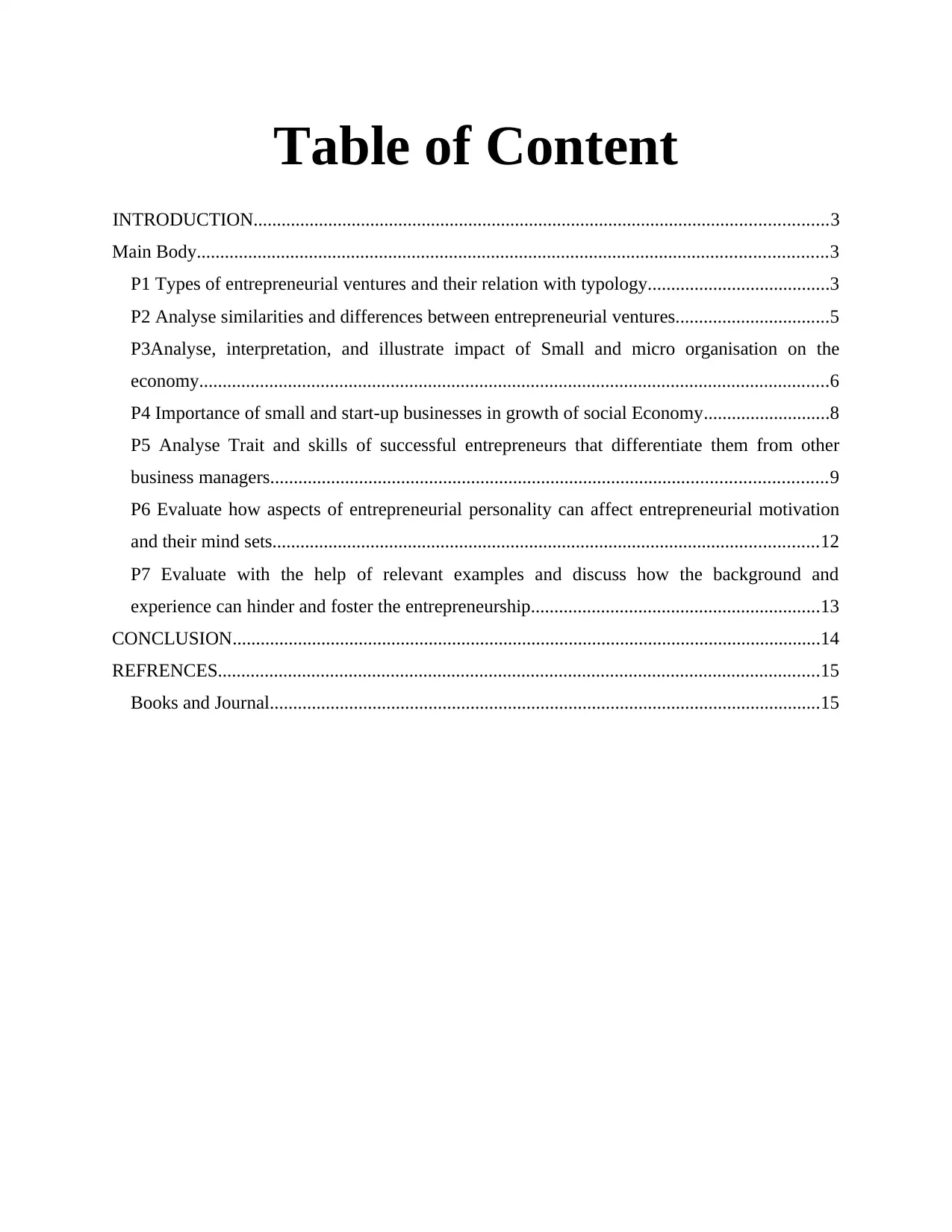
Table of Content
INTRODUCTION...........................................................................................................................3
Main Body.......................................................................................................................................3
P1 Types of entrepreneurial ventures and their relation with typology.......................................3
P2 Analyse similarities and differences between entrepreneurial ventures.................................5
P3Analyse, interpretation, and illustrate impact of Small and micro organisation on the
economy.......................................................................................................................................6
P4 Importance of small and start-up businesses in growth of social Economy...........................8
P5 Analyse Trait and skills of successful entrepreneurs that differentiate them from other
business managers.......................................................................................................................9
P6 Evaluate how aspects of entrepreneurial personality can affect entrepreneurial motivation
and their mind sets.....................................................................................................................12
P7 Evaluate with the help of relevant examples and discuss how the background and
experience can hinder and foster the entrepreneurship..............................................................13
CONCLUSION..............................................................................................................................14
REFRENCES.................................................................................................................................15
Books and Journal......................................................................................................................15
INTRODUCTION...........................................................................................................................3
Main Body.......................................................................................................................................3
P1 Types of entrepreneurial ventures and their relation with typology.......................................3
P2 Analyse similarities and differences between entrepreneurial ventures.................................5
P3Analyse, interpretation, and illustrate impact of Small and micro organisation on the
economy.......................................................................................................................................6
P4 Importance of small and start-up businesses in growth of social Economy...........................8
P5 Analyse Trait and skills of successful entrepreneurs that differentiate them from other
business managers.......................................................................................................................9
P6 Evaluate how aspects of entrepreneurial personality can affect entrepreneurial motivation
and their mind sets.....................................................................................................................12
P7 Evaluate with the help of relevant examples and discuss how the background and
experience can hinder and foster the entrepreneurship..............................................................13
CONCLUSION..............................................................................................................................14
REFRENCES.................................................................................................................................15
Books and Journal......................................................................................................................15
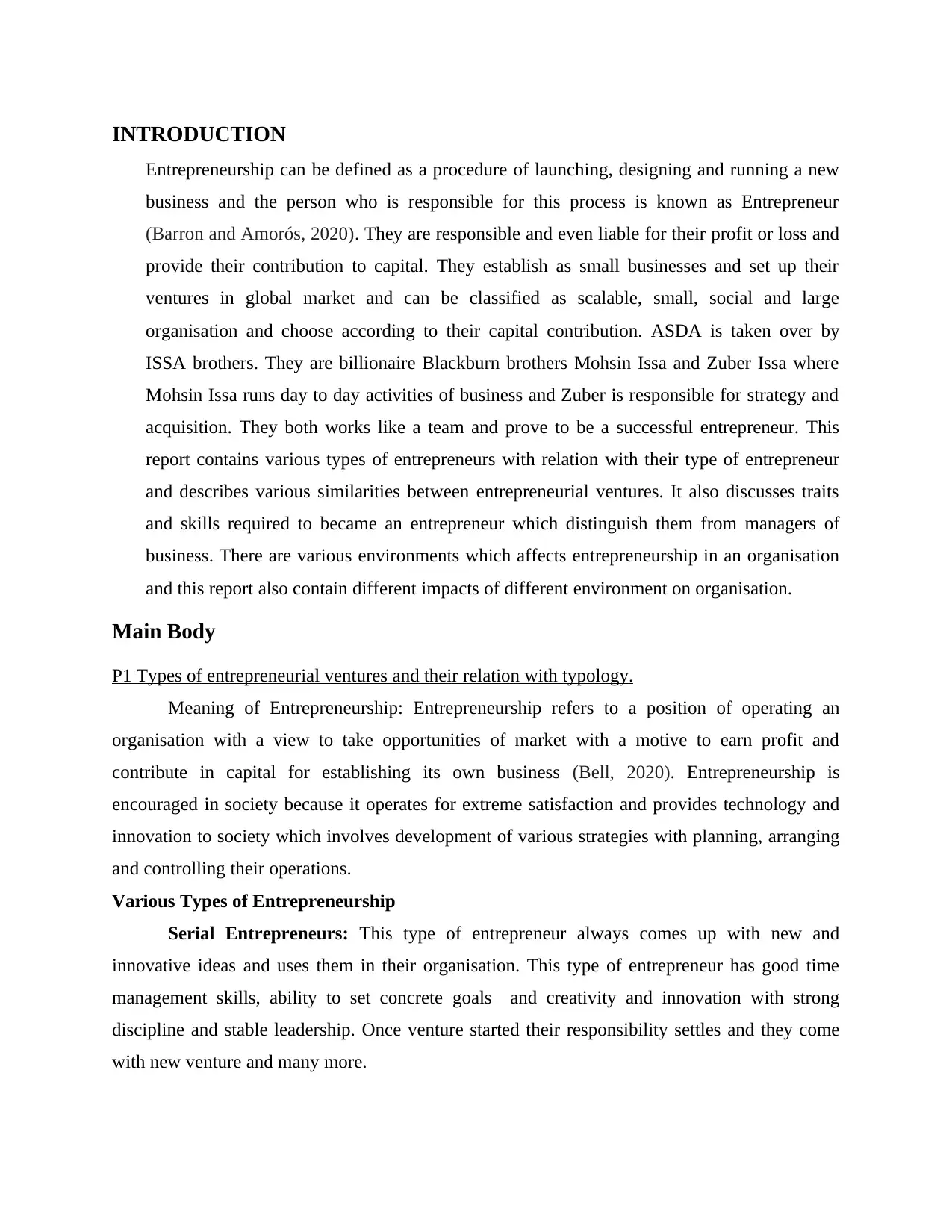
INTRODUCTION
Entrepreneurship can be defined as a procedure of launching, designing and running a new
business and the person who is responsible for this process is known as Entrepreneur
(Barron and Amorós, 2020). They are responsible and even liable for their profit or loss and
provide their contribution to capital. They establish as small businesses and set up their
ventures in global market and can be classified as scalable, small, social and large
organisation and choose according to their capital contribution. ASDA is taken over by
ISSA brothers. They are billionaire Blackburn brothers Mohsin Issa and Zuber Issa where
Mohsin Issa runs day to day activities of business and Zuber is responsible for strategy and
acquisition. They both works like a team and prove to be a successful entrepreneur. This
report contains various types of entrepreneurs with relation with their type of entrepreneur
and describes various similarities between entrepreneurial ventures. It also discusses traits
and skills required to became an entrepreneur which distinguish them from managers of
business. There are various environments which affects entrepreneurship in an organisation
and this report also contain different impacts of different environment on organisation.
Main Body
P1 Types of entrepreneurial ventures and their relation with typology.
Meaning of Entrepreneurship: Entrepreneurship refers to a position of operating an
organisation with a view to take opportunities of market with a motive to earn profit and
contribute in capital for establishing its own business (Bell, 2020). Entrepreneurship is
encouraged in society because it operates for extreme satisfaction and provides technology and
innovation to society which involves development of various strategies with planning, arranging
and controlling their operations.
Various Types of Entrepreneurship
Serial Entrepreneurs: This type of entrepreneur always comes up with new and
innovative ideas and uses them in their organisation. This type of entrepreneur has good time
management skills, ability to set concrete goals and creativity and innovation with strong
discipline and stable leadership. Once venture started their responsibility settles and they come
with new venture and many more.
Entrepreneurship can be defined as a procedure of launching, designing and running a new
business and the person who is responsible for this process is known as Entrepreneur
(Barron and Amorós, 2020). They are responsible and even liable for their profit or loss and
provide their contribution to capital. They establish as small businesses and set up their
ventures in global market and can be classified as scalable, small, social and large
organisation and choose according to their capital contribution. ASDA is taken over by
ISSA brothers. They are billionaire Blackburn brothers Mohsin Issa and Zuber Issa where
Mohsin Issa runs day to day activities of business and Zuber is responsible for strategy and
acquisition. They both works like a team and prove to be a successful entrepreneur. This
report contains various types of entrepreneurs with relation with their type of entrepreneur
and describes various similarities between entrepreneurial ventures. It also discusses traits
and skills required to became an entrepreneur which distinguish them from managers of
business. There are various environments which affects entrepreneurship in an organisation
and this report also contain different impacts of different environment on organisation.
Main Body
P1 Types of entrepreneurial ventures and their relation with typology.
Meaning of Entrepreneurship: Entrepreneurship refers to a position of operating an
organisation with a view to take opportunities of market with a motive to earn profit and
contribute in capital for establishing its own business (Bell, 2020). Entrepreneurship is
encouraged in society because it operates for extreme satisfaction and provides technology and
innovation to society which involves development of various strategies with planning, arranging
and controlling their operations.
Various Types of Entrepreneurship
Serial Entrepreneurs: This type of entrepreneur always comes up with new and
innovative ideas and uses them in their organisation. This type of entrepreneur has good time
management skills, ability to set concrete goals and creativity and innovation with strong
discipline and stable leadership. Once venture started their responsibility settles and they come
with new venture and many more.
⊘ This is a preview!⊘
Do you want full access?
Subscribe today to unlock all pages.

Trusted by 1+ million students worldwide
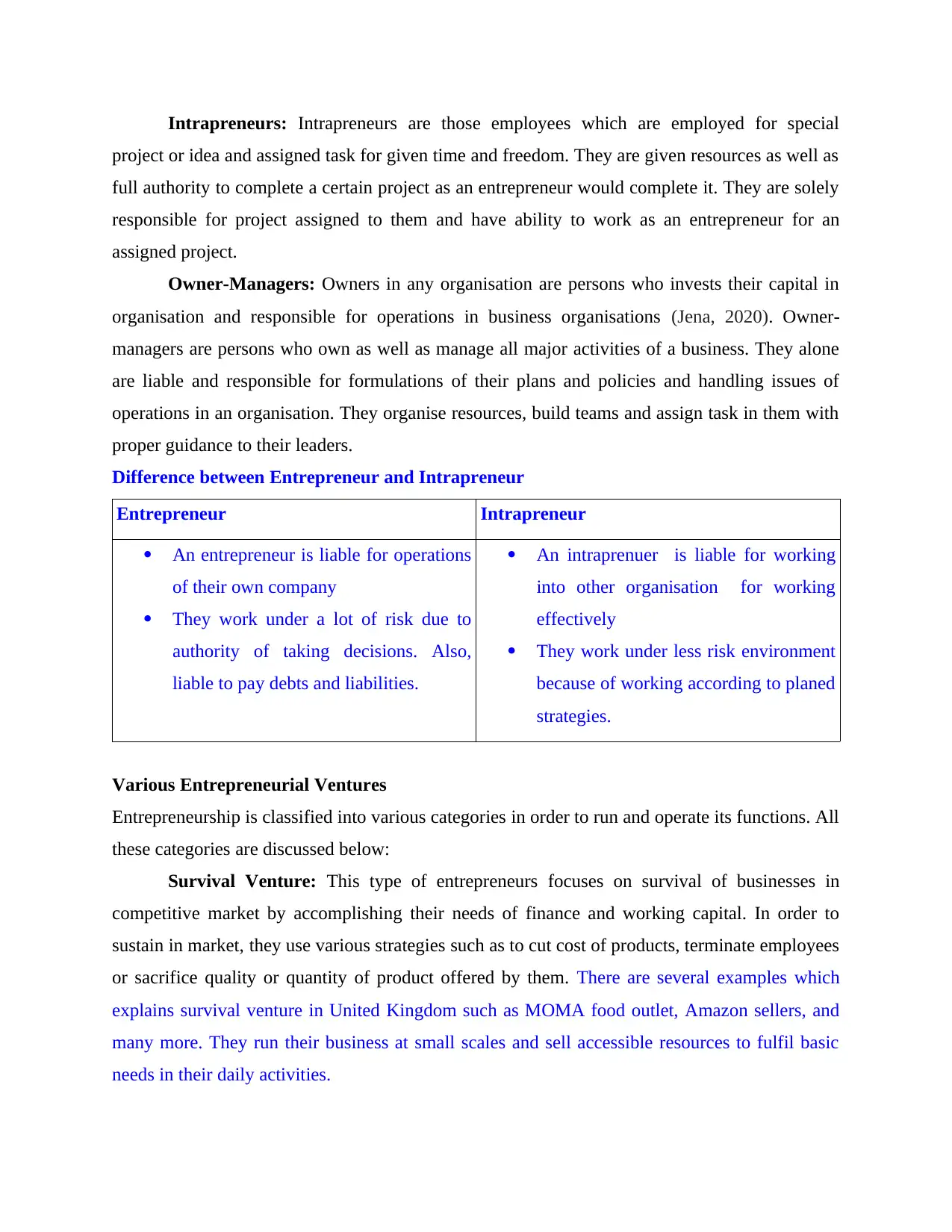
Intrapreneurs: Intrapreneurs are those employees which are employed for special
project or idea and assigned task for given time and freedom. They are given resources as well as
full authority to complete a certain project as an entrepreneur would complete it. They are solely
responsible for project assigned to them and have ability to work as an entrepreneur for an
assigned project.
Owner-Managers: Owners in any organisation are persons who invests their capital in
organisation and responsible for operations in business organisations (Jena, 2020). Owner-
managers are persons who own as well as manage all major activities of a business. They alone
are liable and responsible for formulations of their plans and policies and handling issues of
operations in an organisation. They organise resources, build teams and assign task in them with
proper guidance to their leaders.
Difference between Entrepreneur and Intrapreneur
Entrepreneur Intrapreneur
An entrepreneur is liable for operations
of their own company
They work under a lot of risk due to
authority of taking decisions. Also,
liable to pay debts and liabilities.
An intraprenuer is liable for working
into other organisation for working
effectively
They work under less risk environment
because of working according to planed
strategies.
Various Entrepreneurial Ventures
Entrepreneurship is classified into various categories in order to run and operate its functions. All
these categories are discussed below:
Survival Venture: This type of entrepreneurs focuses on survival of businesses in
competitive market by accomplishing their needs of finance and working capital. In order to
sustain in market, they use various strategies such as to cut cost of products, terminate employees
or sacrifice quality or quantity of product offered by them. There are several examples which
explains survival venture in United Kingdom such as MOMA food outlet, Amazon sellers, and
many more. They run their business at small scales and sell accessible resources to fulfil basic
needs in their daily activities.
project or idea and assigned task for given time and freedom. They are given resources as well as
full authority to complete a certain project as an entrepreneur would complete it. They are solely
responsible for project assigned to them and have ability to work as an entrepreneur for an
assigned project.
Owner-Managers: Owners in any organisation are persons who invests their capital in
organisation and responsible for operations in business organisations (Jena, 2020). Owner-
managers are persons who own as well as manage all major activities of a business. They alone
are liable and responsible for formulations of their plans and policies and handling issues of
operations in an organisation. They organise resources, build teams and assign task in them with
proper guidance to their leaders.
Difference between Entrepreneur and Intrapreneur
Entrepreneur Intrapreneur
An entrepreneur is liable for operations
of their own company
They work under a lot of risk due to
authority of taking decisions. Also,
liable to pay debts and liabilities.
An intraprenuer is liable for working
into other organisation for working
effectively
They work under less risk environment
because of working according to planed
strategies.
Various Entrepreneurial Ventures
Entrepreneurship is classified into various categories in order to run and operate its functions. All
these categories are discussed below:
Survival Venture: This type of entrepreneurs focuses on survival of businesses in
competitive market by accomplishing their needs of finance and working capital. In order to
sustain in market, they use various strategies such as to cut cost of products, terminate employees
or sacrifice quality or quantity of product offered by them. There are several examples which
explains survival venture in United Kingdom such as MOMA food outlet, Amazon sellers, and
many more. They run their business at small scales and sell accessible resources to fulfil basic
needs in their daily activities.
Paraphrase This Document
Need a fresh take? Get an instant paraphrase of this document with our AI Paraphraser
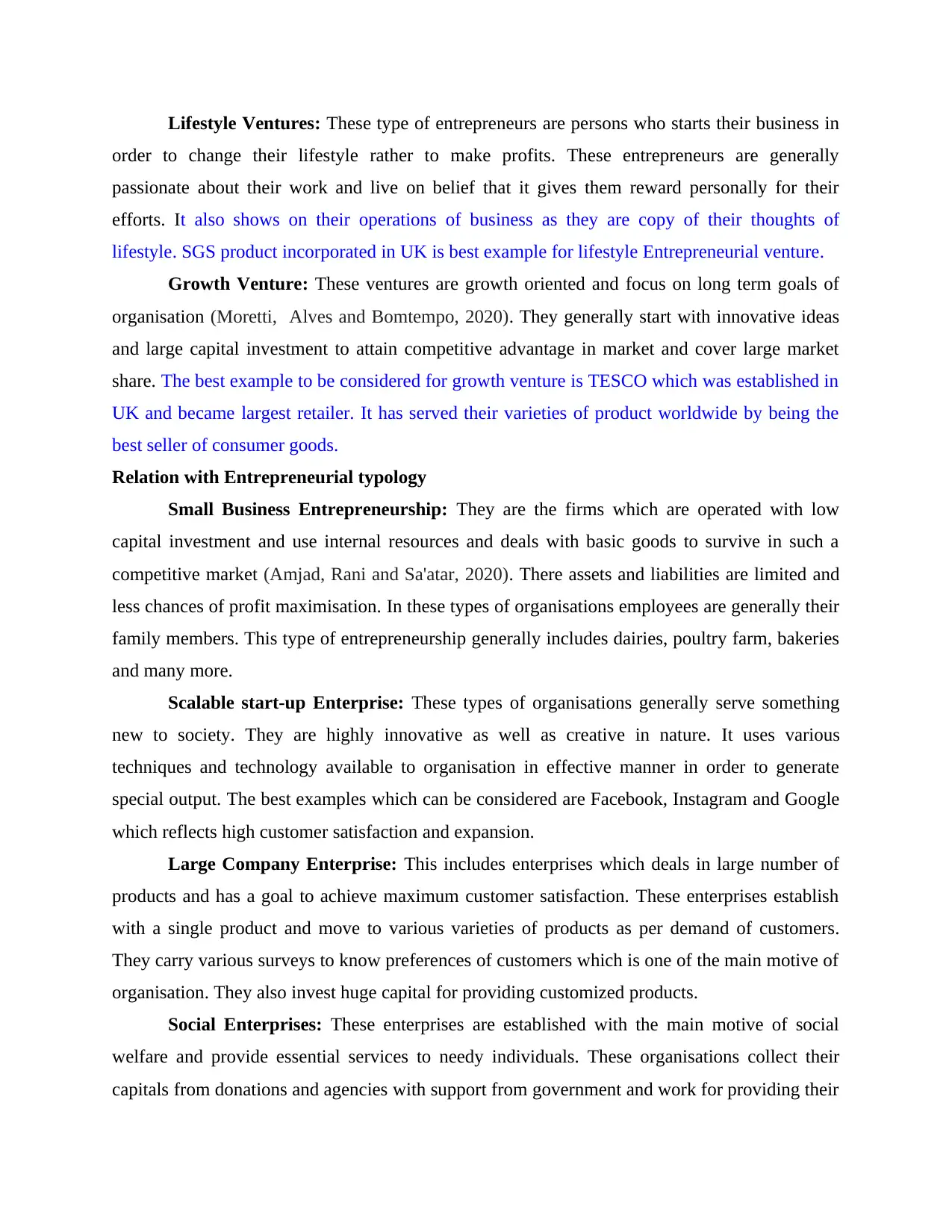
Lifestyle Ventures: These type of entrepreneurs are persons who starts their business in
order to change their lifestyle rather to make profits. These entrepreneurs are generally
passionate about their work and live on belief that it gives them reward personally for their
efforts. It also shows on their operations of business as they are copy of their thoughts of
lifestyle. SGS product incorporated in UK is best example for lifestyle Entrepreneurial venture.
Growth Venture: These ventures are growth oriented and focus on long term goals of
organisation (Moretti, Alves and Bomtempo, 2020). They generally start with innovative ideas
and large capital investment to attain competitive advantage in market and cover large market
share. The best example to be considered for growth venture is TESCO which was established in
UK and became largest retailer. It has served their varieties of product worldwide by being the
best seller of consumer goods.
Relation with Entrepreneurial typology
Small Business Entrepreneurship: They are the firms which are operated with low
capital investment and use internal resources and deals with basic goods to survive in such a
competitive market (Amjad, Rani and Sa'atar, 2020). There assets and liabilities are limited and
less chances of profit maximisation. In these types of organisations employees are generally their
family members. This type of entrepreneurship generally includes dairies, poultry farm, bakeries
and many more.
Scalable start-up Enterprise: These types of organisations generally serve something
new to society. They are highly innovative as well as creative in nature. It uses various
techniques and technology available to organisation in effective manner in order to generate
special output. The best examples which can be considered are Facebook, Instagram and Google
which reflects high customer satisfaction and expansion.
Large Company Enterprise: This includes enterprises which deals in large number of
products and has a goal to achieve maximum customer satisfaction. These enterprises establish
with a single product and move to various varieties of products as per demand of customers.
They carry various surveys to know preferences of customers which is one of the main motive of
organisation. They also invest huge capital for providing customized products.
Social Enterprises: These enterprises are established with the main motive of social
welfare and provide essential services to needy individuals. These organisations collect their
capitals from donations and agencies with support from government and work for providing their
order to change their lifestyle rather to make profits. These entrepreneurs are generally
passionate about their work and live on belief that it gives them reward personally for their
efforts. It also shows on their operations of business as they are copy of their thoughts of
lifestyle. SGS product incorporated in UK is best example for lifestyle Entrepreneurial venture.
Growth Venture: These ventures are growth oriented and focus on long term goals of
organisation (Moretti, Alves and Bomtempo, 2020). They generally start with innovative ideas
and large capital investment to attain competitive advantage in market and cover large market
share. The best example to be considered for growth venture is TESCO which was established in
UK and became largest retailer. It has served their varieties of product worldwide by being the
best seller of consumer goods.
Relation with Entrepreneurial typology
Small Business Entrepreneurship: They are the firms which are operated with low
capital investment and use internal resources and deals with basic goods to survive in such a
competitive market (Amjad, Rani and Sa'atar, 2020). There assets and liabilities are limited and
less chances of profit maximisation. In these types of organisations employees are generally their
family members. This type of entrepreneurship generally includes dairies, poultry farm, bakeries
and many more.
Scalable start-up Enterprise: These types of organisations generally serve something
new to society. They are highly innovative as well as creative in nature. It uses various
techniques and technology available to organisation in effective manner in order to generate
special output. The best examples which can be considered are Facebook, Instagram and Google
which reflects high customer satisfaction and expansion.
Large Company Enterprise: This includes enterprises which deals in large number of
products and has a goal to achieve maximum customer satisfaction. These enterprises establish
with a single product and move to various varieties of products as per demand of customers.
They carry various surveys to know preferences of customers which is one of the main motive of
organisation. They also invest huge capital for providing customized products.
Social Enterprises: These enterprises are established with the main motive of social
welfare and provide essential services to needy individuals. These organisations collect their
capitals from donations and agencies with support from government and work for providing their
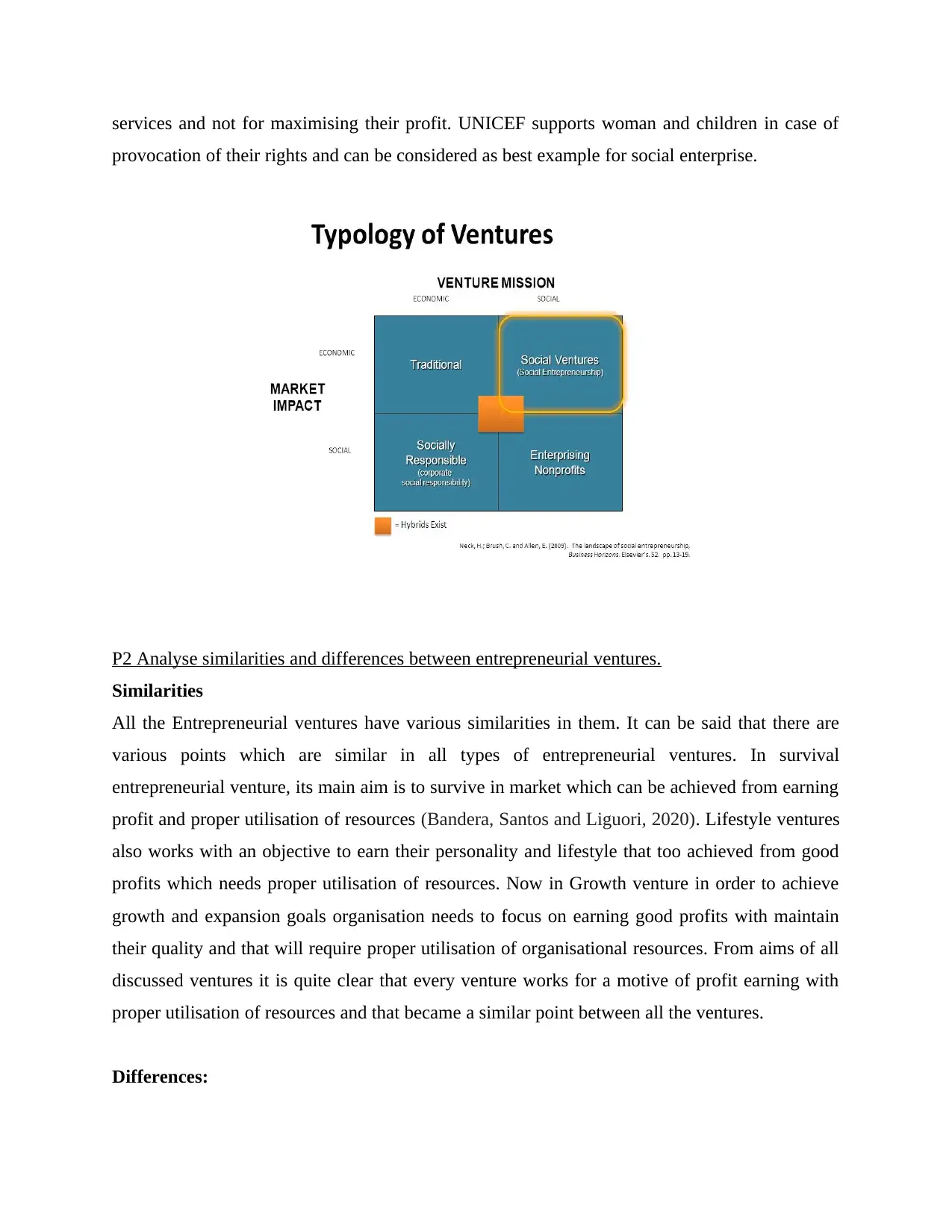
services and not for maximising their profit. UNICEF supports woman and children in case of
provocation of their rights and can be considered as best example for social enterprise.
P2 Analyse similarities and differences between entrepreneurial ventures.
Similarities
All the Entrepreneurial ventures have various similarities in them. It can be said that there are
various points which are similar in all types of entrepreneurial ventures. In survival
entrepreneurial venture, its main aim is to survive in market which can be achieved from earning
profit and proper utilisation of resources (Bandera, Santos and Liguori, 2020). Lifestyle ventures
also works with an objective to earn their personality and lifestyle that too achieved from good
profits which needs proper utilisation of resources. Now in Growth venture in order to achieve
growth and expansion goals organisation needs to focus on earning good profits with maintain
their quality and that will require proper utilisation of organisational resources. From aims of all
discussed ventures it is quite clear that every venture works for a motive of profit earning with
proper utilisation of resources and that became a similar point between all the ventures.
Differences:
provocation of their rights and can be considered as best example for social enterprise.
P2 Analyse similarities and differences between entrepreneurial ventures.
Similarities
All the Entrepreneurial ventures have various similarities in them. It can be said that there are
various points which are similar in all types of entrepreneurial ventures. In survival
entrepreneurial venture, its main aim is to survive in market which can be achieved from earning
profit and proper utilisation of resources (Bandera, Santos and Liguori, 2020). Lifestyle ventures
also works with an objective to earn their personality and lifestyle that too achieved from good
profits which needs proper utilisation of resources. Now in Growth venture in order to achieve
growth and expansion goals organisation needs to focus on earning good profits with maintain
their quality and that will require proper utilisation of organisational resources. From aims of all
discussed ventures it is quite clear that every venture works for a motive of profit earning with
proper utilisation of resources and that became a similar point between all the ventures.
Differences:
⊘ This is a preview!⊘
Do you want full access?
Subscribe today to unlock all pages.

Trusted by 1+ million students worldwide
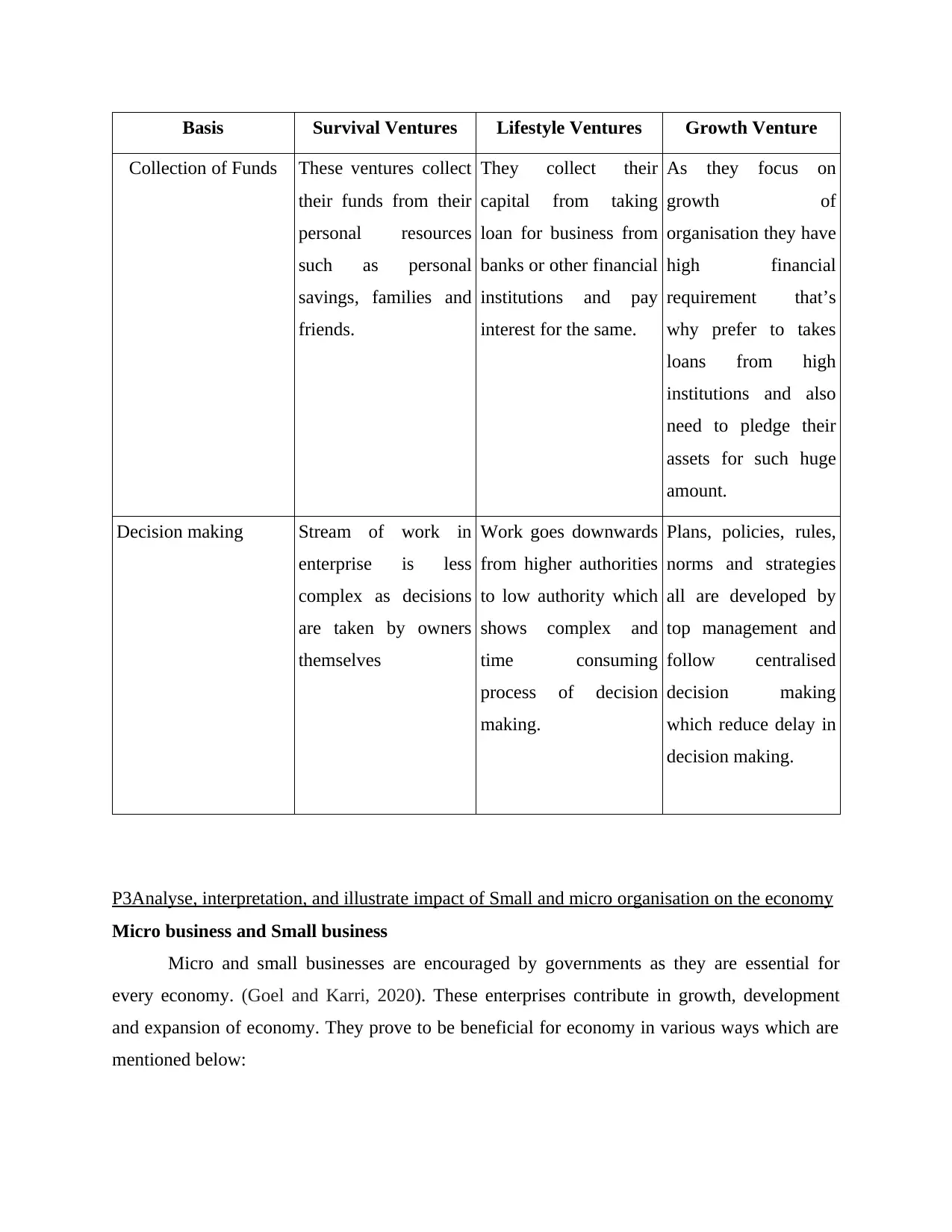
Basis Survival Ventures Lifestyle Ventures Growth Venture
Collection of Funds These ventures collect
their funds from their
personal resources
such as personal
savings, families and
friends.
They collect their
capital from taking
loan for business from
banks or other financial
institutions and pay
interest for the same.
As they focus on
growth of
organisation they have
high financial
requirement that’s
why prefer to takes
loans from high
institutions and also
need to pledge their
assets for such huge
amount.
Decision making Stream of work in
enterprise is less
complex as decisions
are taken by owners
themselves
Work goes downwards
from higher authorities
to low authority which
shows complex and
time consuming
process of decision
making.
Plans, policies, rules,
norms and strategies
all are developed by
top management and
follow centralised
decision making
which reduce delay in
decision making.
P3Analyse, interpretation, and illustrate impact of Small and micro organisation on the economy
Micro business and Small business
Micro and small businesses are encouraged by governments as they are essential for
every economy. (Goel and Karri, 2020). These enterprises contribute in growth, development
and expansion of economy. They prove to be beneficial for economy in various ways which are
mentioned below:
Collection of Funds These ventures collect
their funds from their
personal resources
such as personal
savings, families and
friends.
They collect their
capital from taking
loan for business from
banks or other financial
institutions and pay
interest for the same.
As they focus on
growth of
organisation they have
high financial
requirement that’s
why prefer to takes
loans from high
institutions and also
need to pledge their
assets for such huge
amount.
Decision making Stream of work in
enterprise is less
complex as decisions
are taken by owners
themselves
Work goes downwards
from higher authorities
to low authority which
shows complex and
time consuming
process of decision
making.
Plans, policies, rules,
norms and strategies
all are developed by
top management and
follow centralised
decision making
which reduce delay in
decision making.
P3Analyse, interpretation, and illustrate impact of Small and micro organisation on the economy
Micro business and Small business
Micro and small businesses are encouraged by governments as they are essential for
every economy. (Goel and Karri, 2020). These enterprises contribute in growth, development
and expansion of economy. They prove to be beneficial for economy in various ways which are
mentioned below:
Paraphrase This Document
Need a fresh take? Get an instant paraphrase of this document with our AI Paraphraser
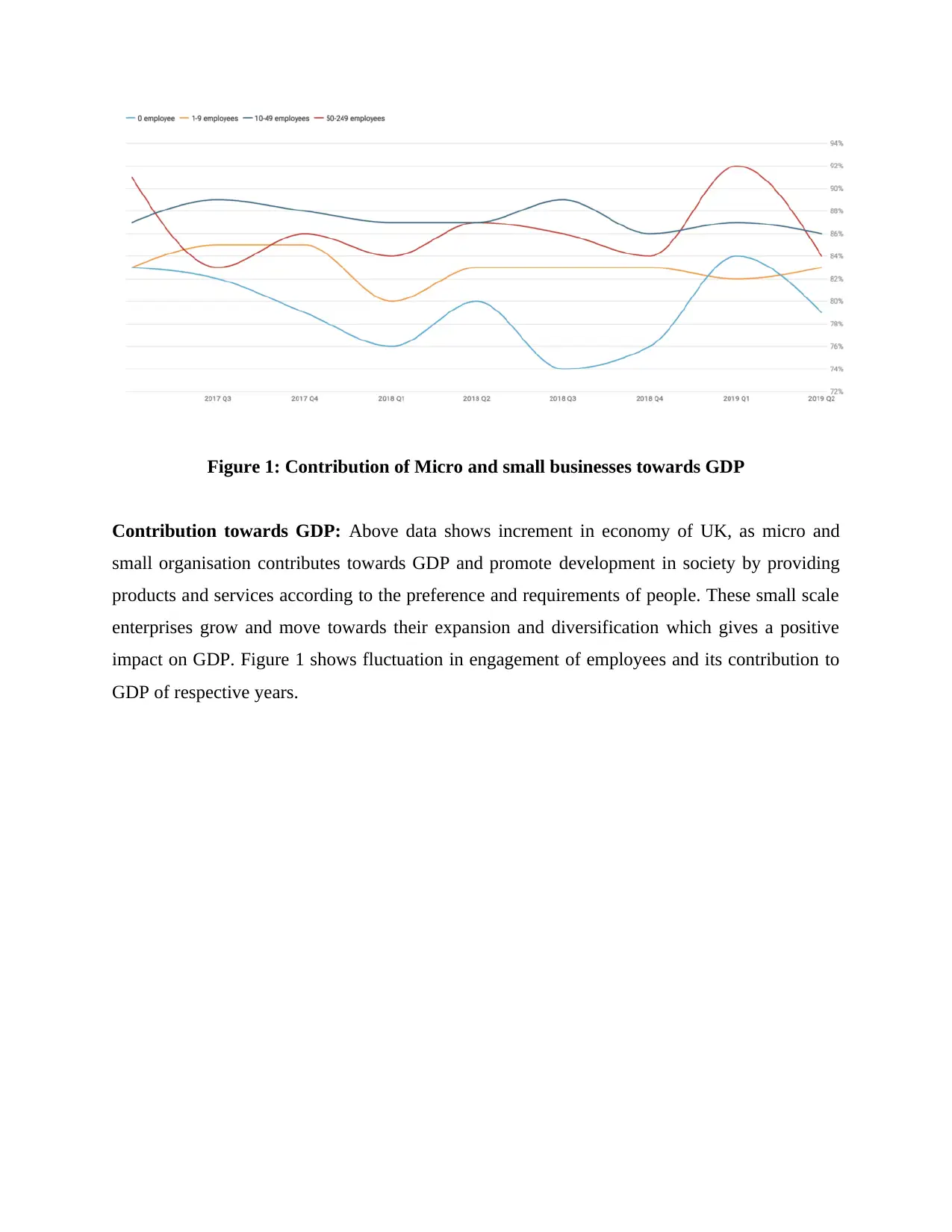
Figure 1: Contribution of Micro and small businesses towards GDP
Contribution towards GDP: Above data shows increment in economy of UK, as micro and
small organisation contributes towards GDP and promote development in society by providing
products and services according to the preference and requirements of people. These small scale
enterprises grow and move towards their expansion and diversification which gives a positive
impact on GDP. Figure 1 shows fluctuation in engagement of employees and its contribution to
GDP of respective years.
Contribution towards GDP: Above data shows increment in economy of UK, as micro and
small organisation contributes towards GDP and promote development in society by providing
products and services according to the preference and requirements of people. These small scale
enterprises grow and move towards their expansion and diversification which gives a positive
impact on GDP. Figure 1 shows fluctuation in engagement of employees and its contribution to
GDP of respective years.
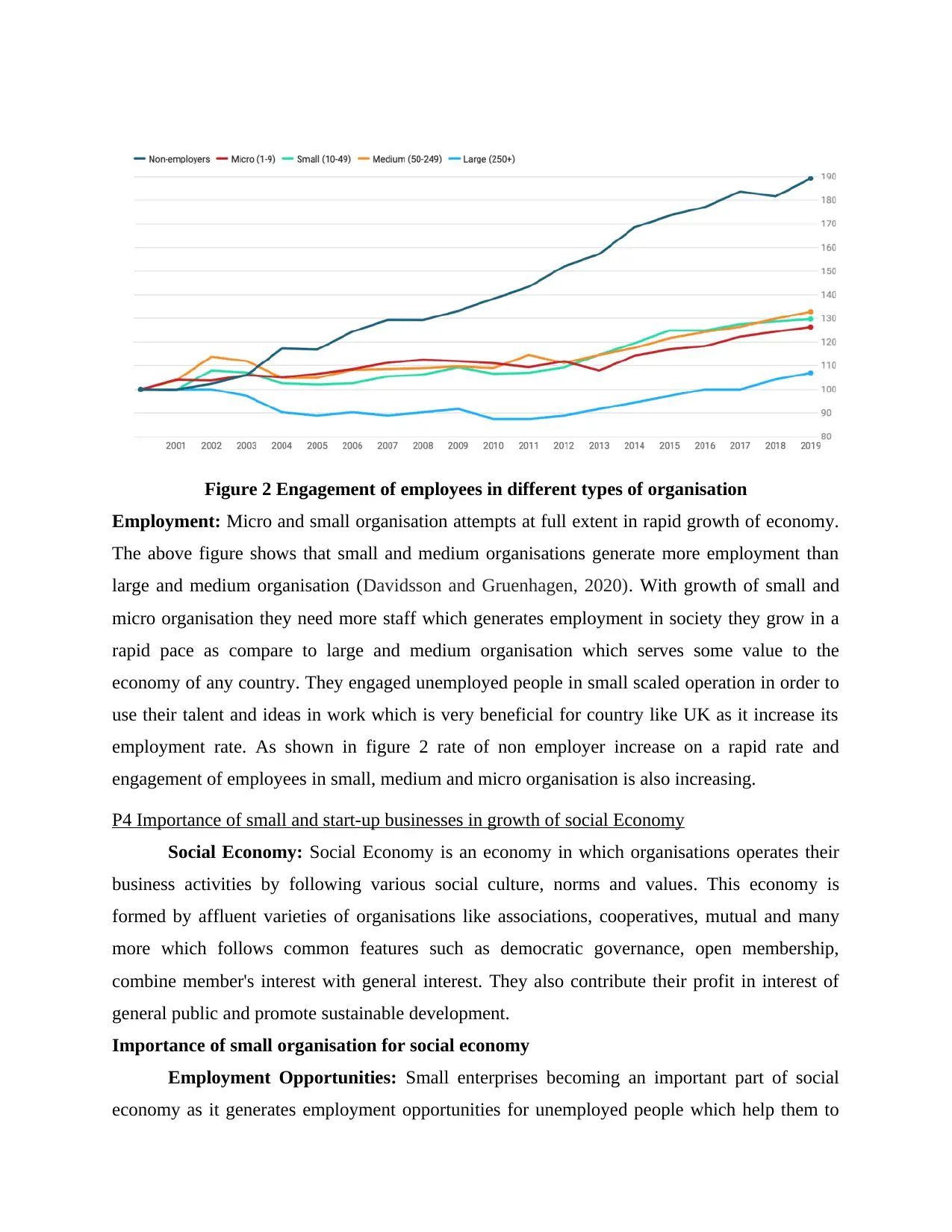
Figure 2 Engagement of employees in different types of organisation
Employment: Micro and small organisation attempts at full extent in rapid growth of economy.
The above figure shows that small and medium organisations generate more employment than
large and medium organisation (Davidsson and Gruenhagen, 2020). With growth of small and
micro organisation they need more staff which generates employment in society they grow in a
rapid pace as compare to large and medium organisation which serves some value to the
economy of any country. They engaged unemployed people in small scaled operation in order to
use their talent and ideas in work which is very beneficial for country like UK as it increase its
employment rate. As shown in figure 2 rate of non employer increase on a rapid rate and
engagement of employees in small, medium and micro organisation is also increasing.
P4 Importance of small and start-up businesses in growth of social Economy
Social Economy: Social Economy is an economy in which organisations operates their
business activities by following various social culture, norms and values. This economy is
formed by affluent varieties of organisations like associations, cooperatives, mutual and many
more which follows common features such as democratic governance, open membership,
combine member's interest with general interest. They also contribute their profit in interest of
general public and promote sustainable development.
Importance of small organisation for social economy
Employment Opportunities: Small enterprises becoming an important part of social
economy as it generates employment opportunities for unemployed people which help them to
Employment: Micro and small organisation attempts at full extent in rapid growth of economy.
The above figure shows that small and medium organisations generate more employment than
large and medium organisation (Davidsson and Gruenhagen, 2020). With growth of small and
micro organisation they need more staff which generates employment in society they grow in a
rapid pace as compare to large and medium organisation which serves some value to the
economy of any country. They engaged unemployed people in small scaled operation in order to
use their talent and ideas in work which is very beneficial for country like UK as it increase its
employment rate. As shown in figure 2 rate of non employer increase on a rapid rate and
engagement of employees in small, medium and micro organisation is also increasing.
P4 Importance of small and start-up businesses in growth of social Economy
Social Economy: Social Economy is an economy in which organisations operates their
business activities by following various social culture, norms and values. This economy is
formed by affluent varieties of organisations like associations, cooperatives, mutual and many
more which follows common features such as democratic governance, open membership,
combine member's interest with general interest. They also contribute their profit in interest of
general public and promote sustainable development.
Importance of small organisation for social economy
Employment Opportunities: Small enterprises becoming an important part of social
economy as it generates employment opportunities for unemployed people which help them to
⊘ This is a preview!⊘
Do you want full access?
Subscribe today to unlock all pages.

Trusted by 1+ million students worldwide
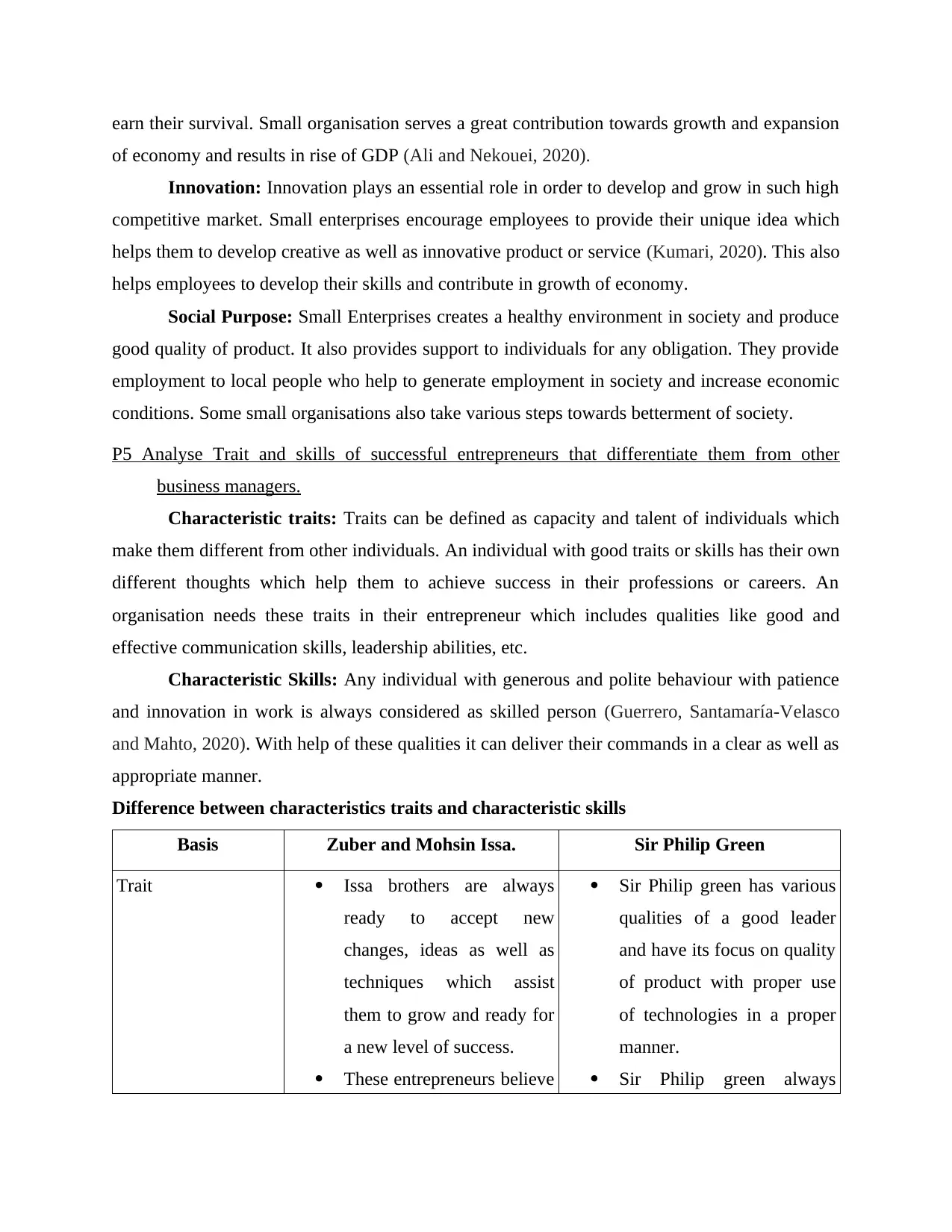
earn their survival. Small organisation serves a great contribution towards growth and expansion
of economy and results in rise of GDP (Ali and Nekouei, 2020).
Innovation: Innovation plays an essential role in order to develop and grow in such high
competitive market. Small enterprises encourage employees to provide their unique idea which
helps them to develop creative as well as innovative product or service (Kumari, 2020). This also
helps employees to develop their skills and contribute in growth of economy.
Social Purpose: Small Enterprises creates a healthy environment in society and produce
good quality of product. It also provides support to individuals for any obligation. They provide
employment to local people who help to generate employment in society and increase economic
conditions. Some small organisations also take various steps towards betterment of society.
P5 Analyse Trait and skills of successful entrepreneurs that differentiate them from other
business managers.
Characteristic traits: Traits can be defined as capacity and talent of individuals which
make them different from other individuals. An individual with good traits or skills has their own
different thoughts which help them to achieve success in their professions or careers. An
organisation needs these traits in their entrepreneur which includes qualities like good and
effective communication skills, leadership abilities, etc.
Characteristic Skills: Any individual with generous and polite behaviour with patience
and innovation in work is always considered as skilled person (Guerrero, Santamaría-Velasco
and Mahto, 2020). With help of these qualities it can deliver their commands in a clear as well as
appropriate manner.
Difference between characteristics traits and characteristic skills
Basis Zuber and Mohsin Issa. Sir Philip Green
Trait Issa brothers are always
ready to accept new
changes, ideas as well as
techniques which assist
them to grow and ready for
a new level of success.
These entrepreneurs believe
Sir Philip green has various
qualities of a good leader
and have its focus on quality
of product with proper use
of technologies in a proper
manner.
Sir Philip green always
of economy and results in rise of GDP (Ali and Nekouei, 2020).
Innovation: Innovation plays an essential role in order to develop and grow in such high
competitive market. Small enterprises encourage employees to provide their unique idea which
helps them to develop creative as well as innovative product or service (Kumari, 2020). This also
helps employees to develop their skills and contribute in growth of economy.
Social Purpose: Small Enterprises creates a healthy environment in society and produce
good quality of product. It also provides support to individuals for any obligation. They provide
employment to local people who help to generate employment in society and increase economic
conditions. Some small organisations also take various steps towards betterment of society.
P5 Analyse Trait and skills of successful entrepreneurs that differentiate them from other
business managers.
Characteristic traits: Traits can be defined as capacity and talent of individuals which
make them different from other individuals. An individual with good traits or skills has their own
different thoughts which help them to achieve success in their professions or careers. An
organisation needs these traits in their entrepreneur which includes qualities like good and
effective communication skills, leadership abilities, etc.
Characteristic Skills: Any individual with generous and polite behaviour with patience
and innovation in work is always considered as skilled person (Guerrero, Santamaría-Velasco
and Mahto, 2020). With help of these qualities it can deliver their commands in a clear as well as
appropriate manner.
Difference between characteristics traits and characteristic skills
Basis Zuber and Mohsin Issa. Sir Philip Green
Trait Issa brothers are always
ready to accept new
changes, ideas as well as
techniques which assist
them to grow and ready for
a new level of success.
These entrepreneurs believe
Sir Philip green has various
qualities of a good leader
and have its focus on quality
of product with proper use
of technologies in a proper
manner.
Sir Philip green always
Paraphrase This Document
Need a fresh take? Get an instant paraphrase of this document with our AI Paraphraser
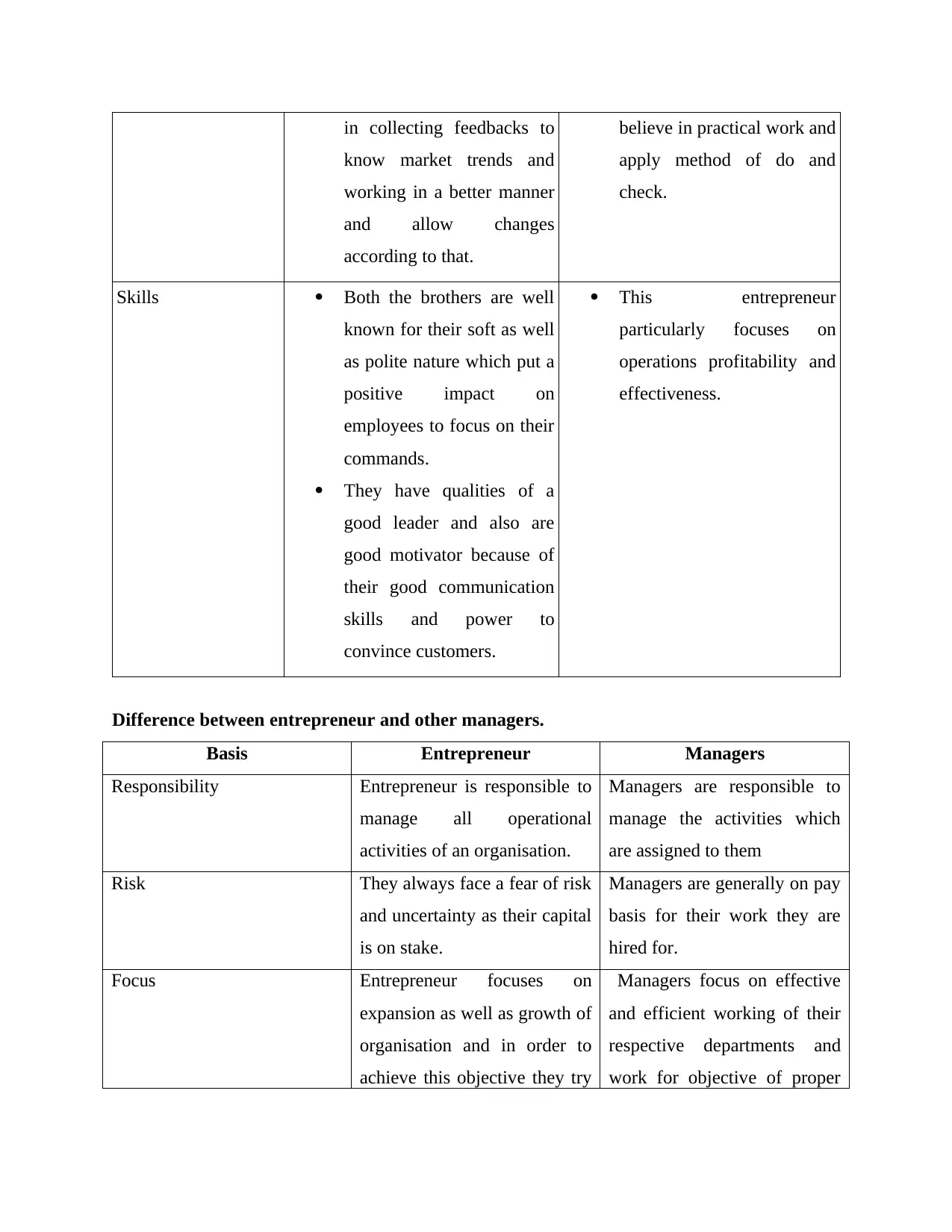
in collecting feedbacks to
know market trends and
working in a better manner
and allow changes
according to that.
believe in practical work and
apply method of do and
check.
Skills Both the brothers are well
known for their soft as well
as polite nature which put a
positive impact on
employees to focus on their
commands.
They have qualities of a
good leader and also are
good motivator because of
their good communication
skills and power to
convince customers.
This entrepreneur
particularly focuses on
operations profitability and
effectiveness.
Difference between entrepreneur and other managers.
Basis Entrepreneur Managers
Responsibility Entrepreneur is responsible to
manage all operational
activities of an organisation.
Managers are responsible to
manage the activities which
are assigned to them
Risk They always face a fear of risk
and uncertainty as their capital
is on stake.
Managers are generally on pay
basis for their work they are
hired for.
Focus Entrepreneur focuses on
expansion as well as growth of
organisation and in order to
achieve this objective they try
Managers focus on effective
and efficient working of their
respective departments and
work for objective of proper
know market trends and
working in a better manner
and allow changes
according to that.
believe in practical work and
apply method of do and
check.
Skills Both the brothers are well
known for their soft as well
as polite nature which put a
positive impact on
employees to focus on their
commands.
They have qualities of a
good leader and also are
good motivator because of
their good communication
skills and power to
convince customers.
This entrepreneur
particularly focuses on
operations profitability and
effectiveness.
Difference between entrepreneur and other managers.
Basis Entrepreneur Managers
Responsibility Entrepreneur is responsible to
manage all operational
activities of an organisation.
Managers are responsible to
manage the activities which
are assigned to them
Risk They always face a fear of risk
and uncertainty as their capital
is on stake.
Managers are generally on pay
basis for their work they are
hired for.
Focus Entrepreneur focuses on
expansion as well as growth of
organisation and in order to
achieve this objective they try
Managers focus on effective
and efficient working of their
respective departments and
work for objective of proper
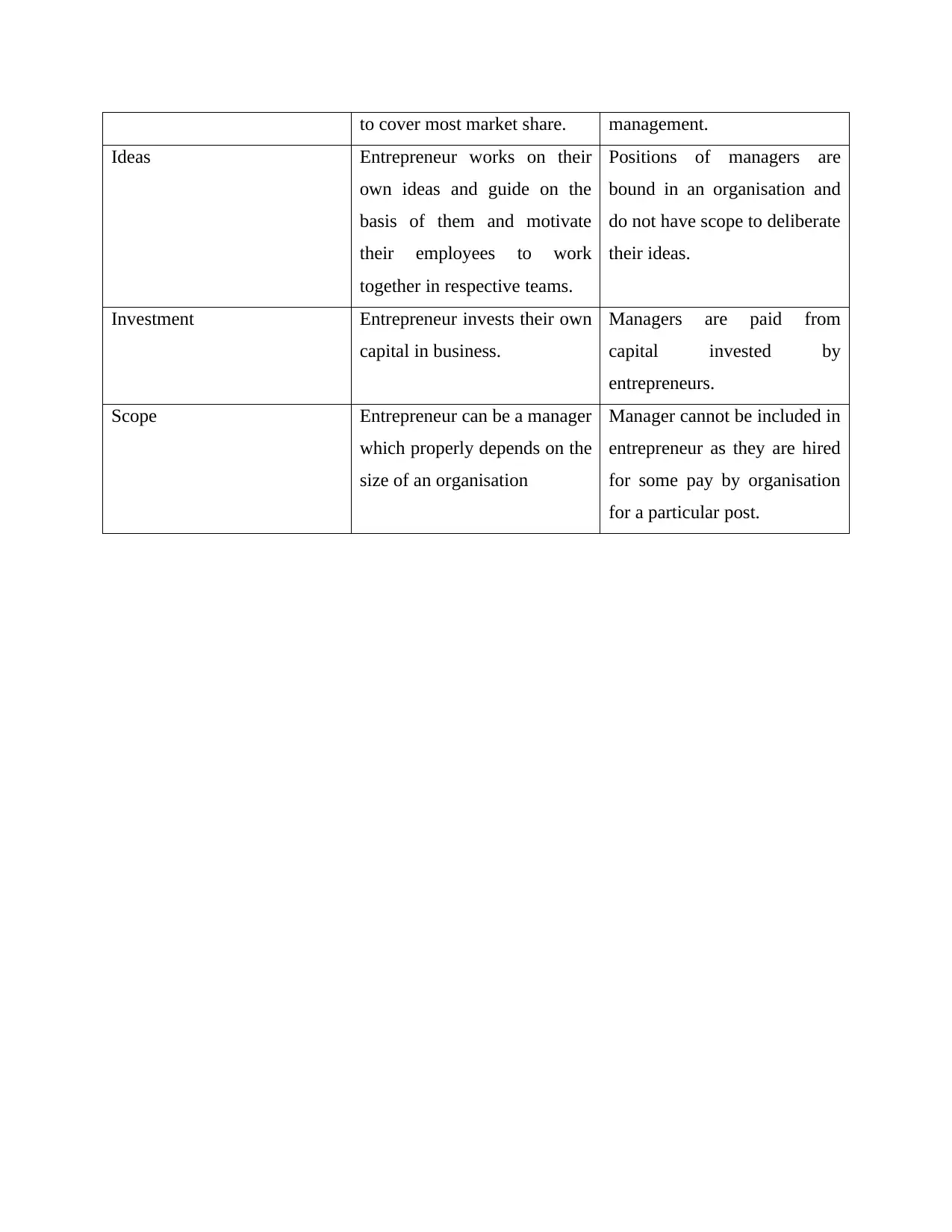
to cover most market share. management.
Ideas Entrepreneur works on their
own ideas and guide on the
basis of them and motivate
their employees to work
together in respective teams.
Positions of managers are
bound in an organisation and
do not have scope to deliberate
their ideas.
Investment Entrepreneur invests their own
capital in business.
Managers are paid from
capital invested by
entrepreneurs.
Scope Entrepreneur can be a manager
which properly depends on the
size of an organisation
Manager cannot be included in
entrepreneur as they are hired
for some pay by organisation
for a particular post.
Ideas Entrepreneur works on their
own ideas and guide on the
basis of them and motivate
their employees to work
together in respective teams.
Positions of managers are
bound in an organisation and
do not have scope to deliberate
their ideas.
Investment Entrepreneur invests their own
capital in business.
Managers are paid from
capital invested by
entrepreneurs.
Scope Entrepreneur can be a manager
which properly depends on the
size of an organisation
Manager cannot be included in
entrepreneur as they are hired
for some pay by organisation
for a particular post.
⊘ This is a preview!⊘
Do you want full access?
Subscribe today to unlock all pages.

Trusted by 1+ million students worldwide
1 out of 19
Related Documents
Your All-in-One AI-Powered Toolkit for Academic Success.
+13062052269
info@desklib.com
Available 24*7 on WhatsApp / Email
![[object Object]](/_next/static/media/star-bottom.7253800d.svg)
Unlock your academic potential
Copyright © 2020–2026 A2Z Services. All Rights Reserved. Developed and managed by ZUCOL.





